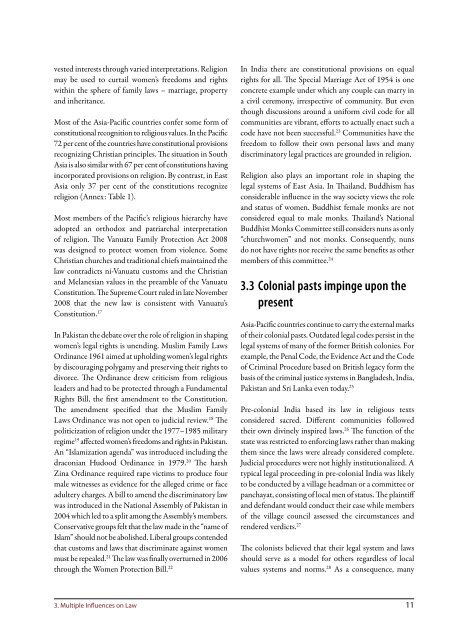Enforcing Rights and Correcting Wrongs - Asia-Pacific Regional ...
Enforcing Rights and Correcting Wrongs - Asia-Pacific Regional ...
Enforcing Rights and Correcting Wrongs - Asia-Pacific Regional ...
Create successful ePaper yourself
Turn your PDF publications into a flip-book with our unique Google optimized e-Paper software.
vested interests through varied interpretations. Religion<br />
may be used to curtail women’s freedoms <strong>and</strong> rights<br />
within the sphere of family laws – marriage, property<br />
<strong>and</strong> inheritance.<br />
Most of the <strong>Asia</strong>-<strong>Pacific</strong> countries confer some form of<br />
constitutional recognition to religious values. In the <strong>Pacific</strong><br />
72 per cent of the countries have constitutional provisions<br />
recognizing Christian principles. The situation in South<br />
<strong>Asia</strong> is also similar with 67 per cent of constitutions having<br />
incorporated provisions on religion. By contrast, in East<br />
<strong>Asia</strong> only 37 per cent of the constitutions recognize<br />
religion (Annex: Table 1).<br />
Most members of the <strong>Pacific</strong>’s religious hierarchy have<br />
adopted an orthodox <strong>and</strong> patriarchal interpretation<br />
of religion. The Vanuatu Family Protection Act 2008<br />
was designed to protect women from violence. Some<br />
Christian churches <strong>and</strong> traditional chiefs maintained the<br />
law contradicts ni-Vanuatu customs <strong>and</strong> the Christian<br />
<strong>and</strong> Melanesian values in the preamble of the Vanuatu<br />
Constitution. The Supreme Court ruled in late November<br />
2008 that the new law is consistent with Vanuatu’s<br />
Constitution. 17<br />
In Pakistan the debate over the role of religion in shaping<br />
women’s legal rights is unending. Muslim Family Laws<br />
Ordinance 1961 aimed at upholding women’s legal rights<br />
by discouraging polygamy <strong>and</strong> preserving their rights to<br />
divorce. The Ordinance drew criticism from religious<br />
leaders <strong>and</strong> had to be protected through a Fundamental<br />
<strong>Rights</strong> Bill, the first amendment to the Constitution.<br />
The amendment specified that the Muslim Family<br />
Laws Ordinance was not open to judicial review. 18 The<br />
politicization of religion under the 1977–1985 military<br />
regime 19 affected women’s freedoms <strong>and</strong> rights in Pakistan.<br />
An “Islamization agenda” was introduced including the<br />
draconian Hudood Ordinance in 1979. 20 The harsh<br />
Zina Ordinance required rape victims to produce four<br />
male witnesses as evidence for the alleged crime or face<br />
adultery charges. A bill to amend the discriminatory law<br />
was introduced in the National Assembly of Pakistan in<br />
2004 which led to a split among the Assembly’s members.<br />
Conservative groups felt that the law made in the “name of<br />
Islam” should not be abolished. Liberal groups contended<br />
that customs <strong>and</strong> laws that discriminate against women<br />
must be repealed. 21 The law was finally overturned in 2006<br />
through the Women Protection Bill. 22<br />
3. Multiple Influences on Law<br />
In India there are constitutional provisions on equal<br />
rights for all. The Special Marriage Act of 1954 is one<br />
concrete example under which any couple can marry in<br />
a civil ceremony, irrespective of community. But even<br />
though discussions around a uniform civil code for all<br />
communities are vibrant, efforts to actually enact such a<br />
code have not been successful. 23 Communities have the<br />
freedom to follow their own personal laws <strong>and</strong> many<br />
discriminatory legal practices are grounded in religion.<br />
Religion also plays an important role in shaping the<br />
legal systems of East <strong>Asia</strong>. In Thail<strong>and</strong>, Buddhism has<br />
considerable influence in the way society views the role<br />
<strong>and</strong> status of women. Buddhist female monks are not<br />
considered equal to male monks. Thail<strong>and</strong>’s National<br />
Buddhist Monks Committee still considers nuns as only<br />
“churchwomen” <strong>and</strong> not monks. Consequently, nuns<br />
do not have rights nor receive the same benefits as other<br />
members of this committee. 24<br />
3.3 Colonial pasts impinge upon the<br />
present<br />
<strong>Asia</strong>-<strong>Pacific</strong> countries continue to carry the external marks<br />
of their colonial pasts. Outdated legal codes persist in the<br />
legal systems of many of the former British colonies. For<br />
example, the Penal Code, the Evidence Act <strong>and</strong> the Code<br />
of Criminal Procedure based on British legacy form the<br />
basis of the criminal justice systems in Bangladesh, India,<br />
Pakistan <strong>and</strong> Sri Lanka even today. 25<br />
Pre-colonial India based its law in religious texts<br />
considered sacred. Different communities followed<br />
their own divinely inspired laws. 26 The function of the<br />
state was restricted to enforcing laws rather than making<br />
them since the laws were already considered complete.<br />
Judicial procedures were not highly institutionalized. A<br />
typical legal proceeding in pre-colonial India was likely<br />
to be conducted by a village headman or a committee or<br />
panchayat, consisting of local men of status. The plaintiff<br />
<strong>and</strong> defendant would conduct their case while members<br />
of the village council assessed the circumstances <strong>and</strong><br />
rendered verdicts. 27<br />
The colonists believed that their legal system <strong>and</strong> laws<br />
should serve as a model for others regardless of local<br />
values systems <strong>and</strong> norms. 28 As a consequence, many<br />
11


